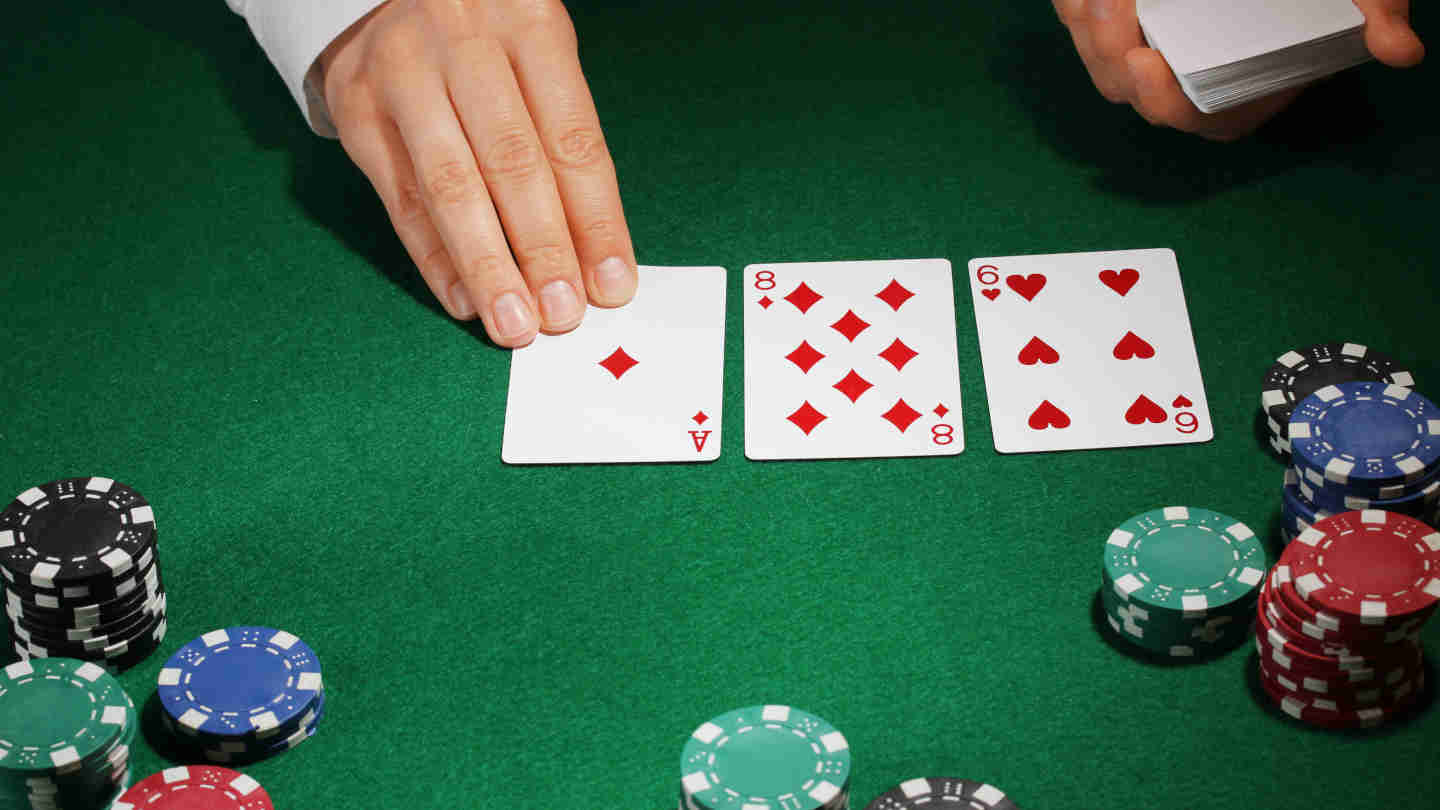Block Bet in Poker – When to Use Blocker Bet to Protect Your Hand?

8 minutes
The blocker bet is a term used for a betting strategy in which you are using a small bet, typically around 20-33% of the pot, to prevent your opponents from betting a more considerable amount when you are in a disadvantageous position.
Understanding when and how to use this type of bet can give you a significant advantage at the poker table.
In this article, we explore the ins and outs of the block bet in poker, including what it is, when to use it, how to make a blocker bet, and when not to use it.
What Is a Block Bet in Poker?
A block bet in poker is a strategic move where a player makes a small bet to control the pot size and prevent their opponents from making big bets themselves.
This type of bet is usually made when the player is out of position and has a marginal hand that may not be strong enough to call a larger bet.
The idea behind the blocking bet is to create a situation in which the opponent is uncertain about the strength of the player’s hand and will lean towards calling the small bet instead of going for a raise.
If used in the right situations, a well-timed blocker bet can also be used with the opposite purpose: to make your opponents think that you have a weak hand and induce them to make a raise or to bluff when they’re the one holding a weak hand.
When to Use a Blocker Bet in Poker?

In poker, blocker bets can be used in various situations to manipulate the pot size and gain an advantage over opponents.
Here are some common scenarios in which the blocker bet can be useful.
Protecting a Marginal Hand
As we mentioned before, one of the primary purposes of block betting is to protect marginal poker hands that may not be strong enough to call a big bet.
This is particularly useful when a player is out of position and has to act first in a betting round. In this situation, a small blocker bet can be made to discourage the opponent from making larger bets which can be difficult to call with a marginal holding.
By making a small blocker bet, in these situations, you can keep the pot small and control the amount of chips that will be invested into the pot, thus reducing the risk of losing too much money.
Bluffing With a Weak Hand
Blocker bets can also be used to get a good price on a bluff, or, in other words, avoid risking a lot of chips when bluffing your opponents.
Bluffing with small bets is an excellent option in cases where you believe your opponent ignores the size of the bet and focuses more on the strength of their hand.
By using a blocker bet, you are increasing your risk-to-reward ratio and saving yourself money in situations in which it turns out that your opponent has a strong hand.
This is a particularly useful tactic against tight players who play a narrow range of hands and are more likely to fold to small bets when they miss the board.
To Get a Better Price on a Draw
One of the situations that are often overlooked by newbie players and in which a block bet can significantly increase your win rate is when you have a draw out of position against an aggressive opponent.
For example, if you are the preflop aggressor and you have a draw on the flop, in most cases, you will either bet big or check, hoping to see a free card.
The problem with checking in this situation is that you are not giving your opponent a chance to fold. At the same time, you are giving them an opportunity to take the initiative in the hand and force you out of the pot by giving you bad pot odds with a big bet.
To avoid this, one of the things that you can do is make a small blocker bet that will fold out your opponent’s complete air, as well as allow you to see a cheap card.
To Induce a Bigger Bet With a Strong Hand
One of the ways that you can balance your blocker bets and keep your opponents guessing is by using them to induce bigger bets when you have a strong hand.
By making a small bet that suggests weakness, your opponents might be tempted to raise as a response. This approach is beneficial against aggressive players who you know are likely to raise or bet big, regardless of the strength of their hand.
This approach requires that you have a good read on your opponents so that you are pretty sure that they will raise your bet and not just call.
How to Make a Blocker Bet in Poker

Blocker bets can be an effective poker strategy, but only if you use it in the right situations. With this said, here are some tips that will help you improve your blocker bet game.
Factors to Consider When Making a Blocker Bet
Before you make a blocker bet, there are several factors that you should consider, including the opponent’s play style, position, and previous actions.
For example, an aggressive opponent may be more likely to raise your blocker bet. Against these opponents, it is best to avoid blocker betting with a marginal hand or a draw. Instead, use the blocker bet to induce bigger bets in situations in which you have a great hand.
You should also consider your position. Blocker bets are less effective or purposeful when used in position rather than out of position.
Choosing the Right Size for the Blocker Bet
One of the keys to making a successful blocker bet is choosing the right bet size. In most situations, your blocker bet should be small, around 20-33% of the pot size.
This bet sizing allows you to minimize the risks of the bet and makes it difficult for the opponent to raise, as it represents a significant percentage of the pot.
However, the exact size of the blocker bet will depend on the situation and should be determined based on its purpose.
If the purpose of your blocker bet is to see a cheap showdown or to see the next card, then you should reduce the size of your bet as much as possible without giving away your intentions.
When Not to Use a Blocker Bet in Poker
While blocker bets can be a useful tool, like with everything else in poker, they are not a one-fits-all solution. There are situations in which it is not advisable to use this approach.
Here are some of the scenarios where you should avoid using blocker bets.
Against Aggressive Players
If you are using blocker bets for their primary purpose, that is, to control the size of the pot with a weak hand, then you shouldn’t implement this strategy against aggressive opponents.
This type of opponent is more likely to raise your bet since they will often interpret it as a sign of weakness and try to take the pot away from you with a hefty raise.
In these situations, you might invest more money in the pot with a blocker bet (if you call your opponent raise) than you would with a regular-size bet.
A great strategy against this type of opponent is to use blocker bets to induce them to make a raise in situations in which you want to extract more value with a good hand.
When the Board is Unfavorable
Another situation in which a blocker bet might not be effective is when the board is unfavorable for your range.
If the community cards do not favor your range, making a small bet will not prevent a competent opponent from making a larger bet, whether he has a better hand than you or not.
In these scenarios, you might be better off with checking or folding rather than making a small bet, and then, when your opponent makes a large raise, guessing if they really have a better hand or if they are just looking to exploit you.
When Playing in a Multi-Way Pot
Blocker bets are typically made when you are playing against one opponent since the effectiveness of a blocker bet is reduced if there are more players in the hand.
More players in the hand means that there is a higher chance that someone has a big hand. In such scenarios, small bets will not be enough to deter opponents from making large bets, and you might end up losing more money than if you were just to check your option.
Blocker Bet Poker Strategy Tips

In order to add blocker bets to your poker strategy as a valuable tool, there are several key strategies that you need to keep in mind when utilizing these bets.
Reading Your Opponents
To effectively use a blocker bet, reading your opponents and understanding their tendencies is crucial.
By observing their betting patterns and actions, you will better understand when a blocker bet may be effective and when it may not.
This information will help you determine whether your opponent is likely to call or fold to a small bet or whether they are likely to make a raise.
Balancing Your Blocker Bets
Another essential thing to understand is that you must balance your blocker betting range to prevent competent players from exploiting you.
This means using blocker bets when you have marginal hands as well as when you are holding good hands. Doing so will prevent good opponents from raising you every time you make a small blocker bet.
In addition, you should also use different sizings to mix up your tactics and keep your opponents guessing.
Final Thoughts on Blocker Bets in Poker
When used correctly, blocker bets are a great way to improve your game. They can be used to protect marginal hands, limit losses, bluff, and induce larger bets.
However, it is essential to pay attention to different factors that will impact your decision to block bet and use this strategy selectively so that you avoid becoming transparent.
- Poker Squeeze Play – Which Hands Make the Most Sense for Squeezing? - August 10, 2023
- How to Play Low Pocket Pairs in Texas Hold’em - July 29, 2023
- How to Make Deep Runs in MTTs More Often - July 22, 2023















